|
Amos 7:12-15 | Ephesians 1:3-14 | Mark 6:7-13
He has let us know the mystery of his purpose… that he would bring everything together under Christ, as head, everything in the heavens and everything on earth. (Eph. 1:9-10) This morning, both our first reading and the gospel give us a brief insight about of a possible cost for cooperating with God. First, we read how the prophet Amos is requested to leave a royal shrine (or even being banned from it) because his words of prophecy were too upsetting for the people hear; and then, Mark describes how the Twelve are told that, in certain instances, people will not welcome them. In both readings this personal cost is identified as rejection. Many people do not want to hear God’s words; they spurn his healing and the fullness of life he offers if this means giving up cherished habits; they do not want to change their way of life, and so they dismiss God. In so doing, they also reject those who cooperate with him. But although the cost of being a Christian is a clear theme in the Lectionary, I don’t really want to focus on it; rather, I would like to look at the positive aspects of cooperating with God; at those tasks we ought to do. Reading between the lines we see that in today’s readings Amos, Saint Paul, and the Twelve do something entrusted to them by God. Their examples give us a flavour of the jobs at hand… Amos proclaims the demise of a people who have forgotten the justice God had commanded them to practice, those who ‘trample on the needy, and bring to ruin the poor of the land’ (Amos 8:4); Paul writes words of praise about the blessings and the freedom which God bestows on those who accept the Lord Jesus (Cf. Eph. 1:14); and the Twelve set out to cure the sick and encourage people to change their way of life (Cf. Mark 6:13). To proclaim justice, to praise, to cure, and to encourage; these are just a few of the tasks God entrusts to those who endeavour to do their bit in bringing about his plan for creation. Yes, God has a plan. God has a plan, a purpose, (you could say “a goal”) for creation and he invites everyone to cooperate with him so that a new creation may come to fruition. In the letter to the Ephesians, St Paul affirms that God has revealed his plan in the Lord Jesus. This is an all-encompassing design that will include both heaven and earth; both the spiritual and material realms, so often seen at odds with each other. And his purpose is to ‘bring everything together under Christ, as head’ (Eph. 1:10). But what does it mean? Depending on the Bible translation you have at home, this verse may say something a little different. It could be translated as “to sum up”, “to unite”, “to gather again”, and even as “to restore” things to perfection. Out of all these possible meanings we see that God’s plan is that everything that exists might find unity in the Lord Jesus; a unity which was in him from the beginning of creation (because ‘all things came into being through him’ John 1:3), a unity that was lost, but that, once restored, it is going to be the hallmarked by justice, by peace, and by the joy of the new creation… And as God sets forth his plan he also calls people to work with him to establish it. So how can we see the restoration of all things in Christ for ourselves? How can we chip-in, as it were, and to do our bit in furthering God’s plan? I am sure we can all think of ways in which we can minister to one-another, serve God within his Church, and feel like we are doing enough. Yet, gathering all things in Christ goes beyond this. It means working to unite and to restore everything to the sovereignty, centrality, and primacy of Jesus. It means intentionally transforming our communities by asking ourselves (first) and (then to) those around us to let go of individualistic attitudes and self-centredness, so as to direct our every attention, and every effort towards Jesus. At the beginning of the twentieth century, at a time of some political turmoil, a saintly Pope, Pius X, wrote that all Christians, have a vocation to restore all things in Christ, and therefore they must ‘seek to restore Jesus Christ to the family, the school and society... They take to heart the interests of the people, …endeavouring to dry their tears, to alleviate their sufferings, and to improve their economic condition by wise measures. They strive, in a word, to make public laws conformable to justice and amend or suppress those which are not so.’ (Il Fermo Proposito, (The firm purpose), Pius X, 1905) A tall order for the average Christians; that may be. But time and again the Scriptures show us that cooperating with God is not a task entrusted to the elites and to those evidently qualified for it. To proclaim justice, to praise, to cure, and to encourage; we see these tasks worked out in Amos, Paul, and the Twelve. To help those in need, to welcome, to teach the faith, to pray for others; we see such things and more in the lives of the saints. It is these people, that is to say, people like you and me, which God calls to cooperate with him.
0 Comments
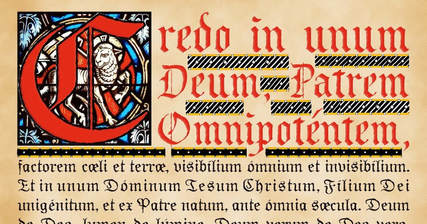 Mark 5:21-43 One of the synagogue officials came up, Jairus by name, and seeing him, fell at his feet and pleaded with him earnestly. (Mark 5:22) This morning’s gospel could be interpreted in different ways. For example, the connection which the lectionary makes between the reading from the book of Wisdom and Mark 5 highlights the fact the death and illness are not part of God’s design for creation, and that as a consequence God destroys these conditions every time he meets them in Christ. Instead, I would like to reflect with you on a broader theme which runs through the whole story; the theme of faith in the Lord Jesus. Mark introduces two characters who approach Jesus to find healing; their situations are desperate and it would be easy to think that they both have lost all hope and so they go to Jesus thinking “Well, what do I have to lose!” But if we look closely to the text we see that this is not the case; and instead each character makes a statement of faith in Christ as soon as they approach the Lord. ‘Do come and lay your hands on her to make her better and save her life.’ (Mark 5:23) says Jairus; and ‘If I can touch even his clothes, I shall be well again.’ (Mark 5:28) says the woman to herself. For both Jairus and the woman faith is manifested by their words of trust in Jesus and by their actions. In other words their faith is manifested by the choice of approaching the Lord and trying to find healing through him. So, both characters give us an idea of what faith is; an assent and affirmation, a willing and intentional “yes” to the person of Jesus Christ and to his ministry. As you probably know, I have never been overly fond of evangelical hymns, but there is one which fits this story very well. It sings, ‘O happy day that fixed my choice on Thee my Saviour and my God’ and indeed, this was a happy day for Jairus and the woman who, by opening the doors to Christ, by willingly and intentionally placing their faith in the Lord Jesus, find in him more than they could have ever hoped for. Certainly, their assent is somehow costly in both cases. Jairus, a synagogue official, has to humble himself before a man who was often at odds with the Jewish establishment, and he must face the peer pressure of more orthodox groups. The woman with the haemorrhage must brave rejection and insults from the crowds who knew her to be ritually unclean due to her illness. Yet, whatever the personal cost they faced at the time, by intentionally placing their faith in the Lord both characters are soon rewarded for their decision; for their choice, as it were. So, how is it with us? Do we express our faith in similar terms? And when is the last time we have knelt and we have made and affirmation of faith like Jairus' and the woman's? When was the last time we said in prayer “Jesus, I trust in you”? In the old rite for the Mass, and in the Book of Common Prayer, when the congregation stands to say or sing the Creed, they begin with the words “I believe in one God”. In this church we say “We believe in one God”. Yet, when we say the Creed, Sunday after Sunday, we often blurt out the words without really thinking about what we are actually doing. The Creed is a powerful affirmation of faith, which should be a weekly renewal of our intentional “yes” to Christ… We stand we assume the posture of those who are ready and willing, and we reaffirm together both our individual and our corporate faith; we place our faith squarely and solely again in the one true God. In a sense, we could say, through the Creed we make a statement of faith much in the same way Jairus and the woman did in the gospel. If we do this in all honesty our faith will be genuinely revived, and we will find in God more than we could have ever hoped for. Each Sunday then, would be the “happy day that fixed our choice on our Saviour and our God”. 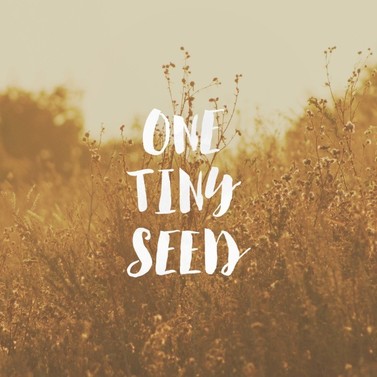 Preacher: Mother Janet Yabsley Ezekiel 17:22-24 | Mark 4:26- 34 ‘Such a large crowd gathered around Jesus that he got into a boat and began to teach them, using many parables.’ (Mark. 4:26) In recent years - and more particularly in the last few months - there have been many occasions on which people have gathered together in large crowds for the specific purpose of demanding change. The nature of these gatherings, and the kinds of change looked for, are variable - yet increasing in frequency. They are happening around the globe. They are usually a plea, in essence, for a more equal, just and participatory society for all, in one way or another. More than five years ago people gathered in great numbers to hear Malala Yousafzai deliver her now-famous speech, ‘One child, one teacher, one book, one pen - can change the world!’ a demand for education for girls in her own region, and in many other countries.* Just a few days ago the ‘silent march’ of people affected by the Grenfell fire tragedy focussed on very many different needs that require urgent attention - all highlighted in a single incident; but one with such far-reaching consequences. Without protest, radical change rarely happens. The prophets recorded in Bible history were the protesters of their day. Everywhere they looked they witnessed injustice and oppression weighing heavily upon the people. In visions and in divine revelations they received warning messages from God. These were their mandate to seek change at the highest level. The word of the Lord - delivered by the prophets to the king - should result in positive action. In today’s Old Testament reading we heard one of Ezekiel’s earliest prophesies. He found it hard to believe that he had been chosen to proclaim the word of God, but through him God’s plans to bring messages of hope to the people of Israel were extremely effective. Speaking at the time of impending conflict with Babylon, Ezekiel foretold the time when all nations would come together under God’s rule of justice and mercy - a kind of looking forward in hope. He painted an imaginative picture as a way of revealing God’s plan:- All manner of birds of many different species would flock to the tallest, most majestic tree in the land - the mighty Cedar. They would all find a place to rest in its branches. Just so, God’s kingdom of truth and righteousness is stronger than anything else in existence. All nations of peoples would find a home within this kingdom and live together in peace. In contrast, Jesus’ parable of the Mustard Tree proclaims a crisis of the first magnitude! God’s kingdom, heralded most recently by John the Baptist, is now actually here! It has come with the arrival of Jesus the Messiah. The tree, which began life as a tiny seed, has been growing since the beginning of the age, largely unnoticed. It has come to full stature whilst we have been blind to its presence. Out of something small and insignificant, something truly great has emerged. The message about it is urgent! It concerns the here and now. It cannot wait. For in the Kingdom, God’s sovereign power is effective in all human experience. When it pleases God to establish his kingly rule there will be judgment upon all the wrong that is in the world; victory over all the powers of evil; and (for those who have accepted God’s sovereignty) deliverance, and life in communion with Him. To seek the Kingdom of God is to make the doing of God’s will the supreme aim. And all this has echoes in the prayer, ‘Thy Kingdom come…’ Again in contrast to Ezekiel, Jesus does not use the mighty Cedar as his symbol for the Kingdom, but a small shrub, the Mustard. A member of the Brassica family, the Black Mustard flourished profusely in the wild around the shores of the Sea of Galilee, but was cultivated on a large scale for the oil from its tiny seeds. This was used mainly for medication and healing. Whilst fruiting the plant was quite succulent, low to the ground, and not strong enough to support birds in its branches. But at the end of the season after harvesting, the branches dried out in the fierce heat of the climate, and became brittle - rigid enough to support the many and diverse birds feeding on the multitude of insects to which it was host. Just so, Jesus’ power was in his weakness, reflected here in a parable that uses the symbolism of a tiny seed. He was not afraid to speak of his own vulnerability. But that is not an attractive idea to many who would prefer to see power in images of towering strength. The king of the heavenly Kingdom, however, is the Prince of Peace; full of mercy and loving-kindness; seeking the lost; friend of the outcast; servant of all. Within this framework, previously unquestioned popular notions of the ways of God are turned upside-down… ‘whoever does not receive the Kingdom as a little child will never enter it.’ One thing is clear - both Jesus and the prophets-of-old understood God’s Kingdom not as ‘Utopia’ - something unattainable, but as present reality. They also understood that it cannot come to fulfilment without the determination of those who seek it to draw closer to God in prayer. That is why Jesus made the crowds sit down and rest… ‘“Come away to a lonely place, and rest a while” …for they had no time, even to eat!’ Contemplation, adoration, thanksgiving; these things are the path towards trust in the true and living God; the only foundation upon which we can grow and continue to grow; and take our place in a more just, equal and participatory society for all**. * Malala Yousafzai - speech at her award ceremony Nobel Prize for Peace. ** A participatory society includes every person within the availability of its freedoms, rights, opportunities and protections, under a just system of law.  Leviticus 13:1-2, 44-46 Mark 1:40-45 ‘Feeling sorry for him, Jesus stretched out his hand and touched him. ‘Of course I want to!’ he said. ‘Be cured!’ (Mark 1:33-34a) The gospel presents us with a miraculous healing which ends up spreading Jesus’ fame as a healer and wonderworker to such a great degree that by the end of it people from far and wide come to seek the Lord’s help wherever he went (Cf. Mark 1:45). And out of this short story there are two key elements I would like to look at with you. First, let us look at the leper himself. We read that a nameless man suffering from leprosy (or more likely by an unidentified skin condition) approaches Jesus to ‘plead on his knees’ (Mark 1:40). He does not profess faith in Jesus in any explicit way, but his posture before the Lord gives away what he actually believes; in Biblical time, and perhaps even today, kneeling and/or bowing down was a manifestation of “worship”. This man somehow knows and believes that he is standing before the Son of God. And in him we see a person who comes to Jesus asking for healing with confidence about the Lord’s power and faith in him. St Mark doesn’t give us his name so that each of us could picture him or herself in his place, kneeling, pleading before Jesus; ‘If you want, you can cure me.’ Then, we should look at the issue of ritual purity. Last week’s gospel showed us how Jesus healed those who sought his help under the cover of night – probably because nigh-time was the only time they could have wandered around without being judged against the strict standards of Jewish purity laws. Today’ story follows on from that, by showing us yet another person oppressed by the sigma of being ritually unclean because of their illness, someone who had to live outside built up areas, had to warn others about his uncleanliness, and had to abide to the purity rules set out in our first reading. Undoubtedly, Jesus could have cured the man without even a word. But instead he chooses to reach out to the man and to touch him, jeopardising his own ritual integrity, and contracting the same social stigma by association. Why? ‘Feeling sorry for him, Jesus stretched out his hand and touched him. ‘Of course I want to!’ he said. ‘Be cured!’ (Mark 1:33-34a) Jesus feels sorry for him. Or, in a better translation, Jesus has compassion for him; Jesus in that moment is moved by the literally gut-wrenching feeling of compassion – “suffering with”. He reaches out to heal and to give the poor man that human contact which had been denied to him since the very first moment he had been pronounced unclean. But in touching the leper Jesus also shows that nothing whatsoever we could bring to or share with him could ever make him unclean – he has authority over illness, the law, and whatever stigma we can think of. On Wednesday we will enter the holy season of Lent. This time of spiritual renewal calls us each year to do two things; to return to God with all our hearts, acknowledging our sins, so as to discover anew forgiveness and freedom in Jesus; and also to exercise self-denial and charity so as to break bad habits, growing into the likeness of Christ. During this time our church will look increasingly sombre as the weeks will go by, we’ll put ash on our heads, a few of us will give up pleasurable things, and others will redouble their efforts in doing good works and in giving to charity. In all these things, it is as if we humbled ourselves before God, so as to move him to move his compassionate heart towards us, and through compassion to win pardon and grace. So, as we stand on the threshold of Lent, today’s reading teach us something about the season we are about to enter. First, as Jesus shows us that no illness can make ritually unclean, let us imitate him in the way we show compassion and reach out to others. Today, the Lord Jesus shows us divine healing powers which we do not possess, but the principle behind his actions holds true for each one of us. By imitating Jesus, striving to grow into his likeness, let us be moved to compassion towards those affected by the stigmas of our society. And in compassion let us reach out to heal. Secondly, on a personal level we are all like the leper who approaches Jesus; sin is something that not only we do, but something that pervades our society, something that we cannot cure ourselves. So during Lent let us approach the Lord Jesus with the same confidence and faith shown by this man. Let us fall on our knees and say to the Lord with one voice; “If you want, you can cure me.” Let this be our Lenten prayer – If you want you have the power to save me, my family, my neighbourhood, my world. Please, Lord, do it! 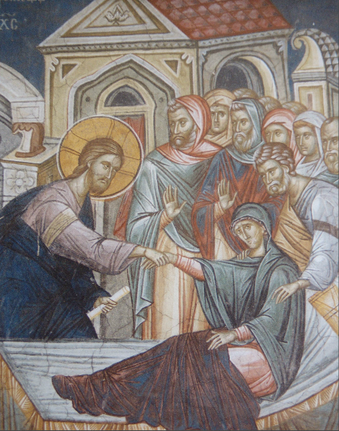 Mark 1:29-39 ‘The whole town came crowding round the door, and he cured many who were suffering’ (Mark 1:33-34a) Not many months ago news of proposed changes in the NHS Devon trust sparked a debate across the Country; should the NHS offer routine surgery to morbidly obese people and to smokers only when these have either shed a few pounds or quit smoking? Or should the system be left as it is, offering appropriate care for all? According to officials, the proposed changes were driven by an attempt to save public funds and to focus the attention of healthcare professionals on those patients with better chances to make a full recovery, without “wasting” – for want of better words – resources on those who were considered more prone to illness because of the their lifestyle. However, this debate quickly revealed a broader ethical dilemma at the root of our society, about whether or not to deny treatment to those who have brought illness upon themselves through bad habits. That is to say, “Who is worthy of care?” and “On whom should we invest our limited resources?” “Who is worthy?” This was (and still very much is) the underlying and divisive question which transcends NHS care to encompass every aspect of our lives. “Why should we show compassion to those whose conditions ae ultimately self-inflicted?” “What charity is more deserving of our money?” “Why should I worry about people outside my family or circle of friends?” To all these questions, and more, a growing number of people might respond that we should not pay for those who have been the cause of their own downfall; that “charity begins at home”; and that limited resources should be invested on those who promise better returns. “Who is worthy of care?” In our first reading Job, a just man whose life has been turned upside-down by circumstances beyond his control, speaks about his dreadful condition. He is very ill, all the members of his family have died, and his great fortune is lost. As things stand, nothing is can bring joy or hope to Job, and in the lowest pits of depression he feels completely abandoned by his friends and by God. Those around him reproach him saying that if he is so stricken down it must be because has sinned; he must have brought illness and misfortune upon himself; what he is experiencing just retribution for his behaviour; and it would be of no use to help or comfort him until he has changed his life and abandoned his bad habits. The people who professed to be Job’s friends are indeed the first to shut their ears and hearts to his plea because, as they see it, he himself it the cause of his own tragic condition, and therefore he is not worthy of care. However, as we turn to the pages of the gospel Jesus teaches us a different way. Here we see the Lord curing those who came or where brought to him without assessing their worthiness, asking them about their faith, or enquiring about the cause of their conditions. But, what we might find even more interesting is that Jesus does not turn away, or judge, or scold anyone, even those who may have brought about their own illnesses. As Jesus meets people in difficulties, people who may well have been in the depths of despair like Job; he just cares for them and cures them. In fact, this scene has two beautiful features; silence and night. Mark tells us that the sick started arriving after sunset, when they could leave their homes or hiding places without fear of being judged or driven away in cold light of day. Then Mark does not report any words said by Jesus – a silence only occasionally interrupted by commands to the demons to shut up. There, in the dead of night, in the silence of prayer, the Lord administers healing beyond comparison and demonstrates that love and care is available to everyone who approaches him. “Who is worthy of care?” We may not have the gifts of healing Jesus demonstrated; yet Jesus gives us a pattern of life for us to imitate, so that we may strive to bring relief to others like the Lord did in the gospel. Our resources, both as a society and as individuals are always limited, yet, the moment we start to question whether a person is worthy of our care, that is the moment we depart from the path Jesus traces for us. 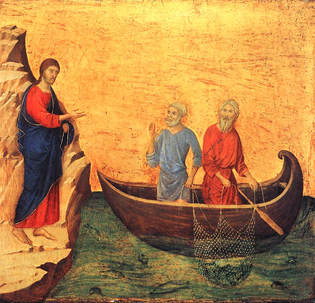 Mark 1:14-20 ‘The time has come’ he said ‘and the kingdom of God is close at hand. Repent, and believe the Good News.’ (Mark 1:15) One of the most annoying things a satnav can say is, “Use the next roundabout to make a U-turn.” Unfortunately, it is also something that I hear often. And if you’re anything like me, you would find it rather frustrating precisely because there, in the middle of your plodding along and trying to find your way through the traffic, the satnav suddenly reminds you that something has gone wrong – heck, not something, but that you have gone down the wrong road – and that only possible way to reach your destination is to turn around immediately and go back to the appointed route. Today’s gospel – and first reading for that matter – does precisely that, as we hear the Lord Jesus saying, ‘Repent, and believe the Good News.’ To repent literally means to turn around. To repent is to turn around and away from what we are doing, and to re-orient ourselves toward Jesus. Just as at Mass we all orient ourselves in one and the same direction towards the Lord present on the altar, so we are called to do in life, as Jesus invites us to make a U-turn from our self-centred, self-seeking (and sometimes self-destructing) ways, and start to follow after him instead. Simple enough to say, but what does repentance actually look like in practice? Perhaps unfortunately, repentance has been badly typecast, and I guess most of us would associate it with doing penance, with giving up things for Lent, with fasting and putting on sackcloth like the citizens of Nineveh, and even with a time of boring, joyless sobriety. But all these things are just tools to lead us to true repentance, which is simply a genuine movement of both heart and mind towards Christ… the start of a journey in his direction. Mark’s gospel gives us a practical example of what repentance should look like by describing how the first disciples begin to follow Jesus. Last Sunday we read together a passage of John’s gospel where Jesus is manifested by John the Baptist as the Christ. In that version of the events, John and Andrew immediately start to follow Jesus after that testimony. But Mark presents us with the different version of the events, where it is Jesus who calls Peter and Andrew, and then James and John to follow. So which one was it? Which version of the events is more likely to be a true account of what happened when the first disciples encountered the Lord? I personally would suggest that John’s description of how him and Andrew begun their journey with Jesus is probably the more accurate, because John the Evangelist was actually one of the people involved. However, there is no need to set one version against the other, because they both agree in putting the same two points across. First, Jesus is this hugely charismatic and compelling figure and whether his call to them was individual and explicit or not, the disciples are instinctively drawn to him, to attach themselves to him. Secondly, to follow Jesus means repenting; turning away and leaving one’s life behind in order to be with the Lord. And this aspect is more prominent is Mark’s version. See how Peter and Andrew are surprised by Jesus in the middle of their working day, and how James and John are called by the Lord in the ordinariness of their daily routine... When the Lord calls them, it’s not like they don’t have anything else to do. As fishermen they own their own businesses, so to speak; they have families to provide for and things to do. Yet, all of them turn away from what they were doing, because they can instinctively see that to follow Jesus is far more important than anything else. So without a word they make their first steps in a new direction, in a new life. And for them this is the beginning of true, life-long repentance. It is never easy to realise when we are going wrong, to eat humble pie and to make a U-turn. But if we carry on and let ourselves be guided by social conventions, bad habits, unfulfilling occupations, or human values with very little meaning, our journey through life can easily become an aimless (if not disastrous) wandering along unsuitable roads. Yet, turning around is always possible and well worth the effort; to repent and accept the gospel is to make the first steps is a new direction toward something different, something better, and something altogether more satisfying. 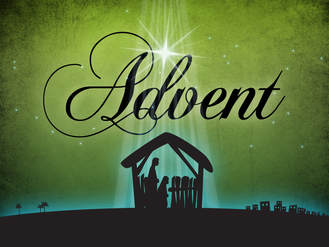 Mark 13:33-37 ‘What I say to you I say to all: Stay awake!’ (Mark 13:37) In our society New Years’ celebrations are usually quite cheerful affairs, sometimes featuring a staggering amount of food, drink, and fireworks; all of this in order to break as much as possible with the old, and usher in the new. And once the partying ceases, we make improbable New Year resolutions wishing to become that new person who is as different as possible from our old self. Then, perhaps, we might find it odd that the new Christian year opens by repeating the gospel message we have been hearing for some time now. Last week the Feast of Christ the King brought the Sunday cycle of the Christian year to an end with the reminder of Jesus sure return as Lord and Judge of all creation. But as today we officially begin a new liturgical year, Mark’ short parable – about the man travelling abroad who leaves his servants in charge of his household – takes us back, not only to last week, but also to a number of other parables we have read recently. And it’s meaning, like that of all those previous parables, is quite clear; when we will find ourselves face to face with Jesus, he will judge each one of us according to our deeds; according to our trustworthiness and commitment to him. But, perhaps, we may find it even more surprising that the new Christian year should open with sombre notes and reduced singing, rather than with a loud bang and cheerful noise. In this, Advent looks a little bit like Lent. Both Advent and Lent are marked by a pressing call to prepare ourselves for that which it to come. Both of these seasons are defined by the colour purple (or violet), the colour of penitence, introspection, and repentance; and the singing of the Gloria, like the flowers that usually adorn our church get put away. So much for New Year cheerfulness! Even the Scripture readings set before us are geared up, not so much towards the joy of Christmas, but rather towards the more sobering thought of being confronted by our faults. This morning the prophet Isaiah holds up a mirror to us all, and gives us a talking to, as it were. ‘We were all like unclean people, - all that integrity of ours like filthy clothing. We have all withered like leaves and our sins, like the wind, have carried us away.’ (Isaiah 64:6) And Jesus then says, ‘What I say to you I say to all: Stay awake!’ (Mark 13:37) This combined message is simple enough and yet difficult to hear at a time when we are all so busy with shopping, parties, and making everything just perfect in time for Christmas. Nevertheless, Advent calls us to assess candidly the state of our society so that we might wake up from injustice, consumerism, and selfish behaviours to prepare our world for the coming of Jesus, and so be found ready to meet him when he will come to us as our judge. We must stay awake in a spiritual sense, so that through prayer and good works, we may be prevented from sleepwalking into the hidden snares of vice. The collect from the BCP for this season helps us to put the Advent message into prayer… Almighty God, give us grace to cast away the works of darkness and to put on the armour of light, now in the time of this mortal life, in which your Son Jesus Christ came to us in great humility; that on the last day, when he shall come again in his glorious majesty to judge the living and the dead, we may rise to the life immortal; through him who is alive and reigns with you, in the unity of the Holy Spirit, one God, now and for ever. Amen. |
Archives
June 2020
Categories
All
|
 RSS Feed
RSS Feed


